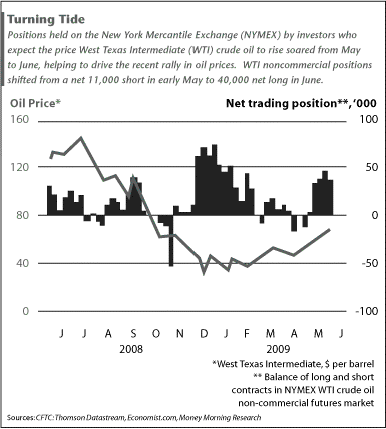By Jason Simpkins
Managing Editor
Money Morning
The Commodity Futures Trading Commission (CFTC) may impose stricter limits on commodities speculators who are believed to be behind the main force behind wild swings in the futures markets over the past two years. The investigation has the support of politicians seeking greater price stability for the global economy and consumers, but traders argue that such restrictions will only reduce market liquidity and not necessarily prices.
CFTC Chairman Gary Gensler said his agency will hold a series of hearings from July through August to determine whether or not it should place new limits on energy futures contracts.
Right now, the CFTC sets limits on the amount of futures contracts in some agricultural products that can be held by market participants. But futures exchanges are free to determine what, if any, position limits should exist for energy futures.
The New York Mercantile Exchange (NYMEX) currently restricts oil traders to 10,000 net futures for any one trading month, and 20,000 net futures for all months. However, traders cannot exceed 3,000 contracts in the last three trading days of the spot month.
"This different regulatory approach to position limits for agriculture and other physically delivered commodities deserves thoughtful review," Gensler said. "It is incumbent upon the CFTC to ensure a fair and transparent price discovery prices for all commodities."
Speculators - specifically, large investment banks, such as Goldman Sachs Group Inc. (NYSE: GS) and Morgan Stanley (NYSE: MS), that build multibillion positions in futures and swaps in the commodities markets - are believed to be a big reason for the sharp fluctuation in oil and gas prices over the past two years.
As of last July, when oil hit a record-high $147 a barrel, financial investors had about $300 billion riding on indexes that track the value of futures contracts, according to the International Energy Agency (IEA). That's about four times as much as in January 2006.
Similarly, a sharp shift in the futures market this year helped oil prices rally about 115% to $73 a barrel in June from below $34 a barrel in February. Positions held on the New York Mercantile Exchange by investors who expected the price of oil to rise shifted from a net 11,000 short to 40,000 net long from May to June, as traders shifted their positions to reflect an improved outlook for the global economy.

That shift alone helped accounted for at least 20% of oil's price surge during that period according to the IEA.
"A lot of what we've seen in recent years has nothing to do with the underlying fundamentals of the market," Tom Bentz, a senior energy analyst at BNP Paribas Commodity Futures Inc. told Bloomberg News. "Something has to be done to reduce some of the speculation, no doubt about it."
In an opinion piece submitted to The Wall Street Journal yesterday (Wednesday) French President Nicolas Sarkozy and U.K. Prime Minister Gordon Brown said that the recent gyrations of the oil market defy the "accepted rules of economics," and called on regulators to take coordinated global action against market interference by speculators.
"The surge in prices last year gravely damaged the global economy and contributed to the downturn," the two statesmen said. "The risk now is that a new period of instability could undermine confidence just as we are pushing for recovery. Governments can no longer stand idle. Volatility damages both consumers and producers."
Brown and Sarkozy called on representatives of the Organization of Petroleum Exporting Countries (OPEC), the IEA, and the Expert Group of the International Energy Forum (IEF) to work develop a shared analysis of future supply and demand trends and a price range that would be more consistent with fundamentals.
"The experts should also consider any measures that could be put in place to reduce volatility," they said. "Discussions should look again into the question of whether trading activity is amplifying erratic price movements."
Brown and Sarkozy said they would pursue the issue further at the meeting of the Group Eight nations in Italy this week.
Of course, not everyone is convinced that more regulation is the answer.
Investment banks, such as Goldman Sachs and JP Morgan Chase & Co. (NYSE: JPM) "are the market makers," Michael Lewis, a partner at the Washington law office Paul, Hastings, Janofsky &Walker LLP told Bloomberg. "Those are the entities that have the huge positions. If the financial players, the banks, the hedge funds, et cetera, are limited to the number of trades they can take, it will lead to less trading. Less trading, I don't think necessarily leads to lower prices."
News and Related Story Links:
-
Wall Street Journal:
We Must Address Oil-Market Volatility


